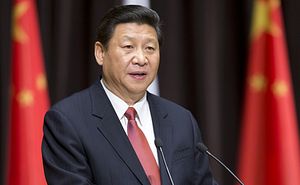When Westerners think of the kind of political crises that could threaten the Chinese Communist Party’s (CCP) rule, they tend to think of mass protests in the mold of Tiananmen Square. While no doubt conscious of this potential threat, Chinese leaders need to guard against a much more diverse set of challenges to their rule. Besides mass protests, these include: ethnic unrest, China’s regional divisions, and the threat posed by CCP members and Chinese elites.
It is this latter threat that will pose the greatest risk to the CCP in the years ahead as it embarks on a much needed economic rebalance.
To understand why elites pose a bigger threat to the Party than the Chinese masses, one needs to consider what China must do in rebalancing the economy. The major imbalance in the Chinese economy is the excessive amount of state-driven investment that has fueled China’s rapid economic growth, particularly in the last decade plus. As Michael Pettis and others have explained, this excessive investment has been made possible primarily by policies that artificially repress the income and wealth of Chinese households.
For example, by keeping the renminbi artificially low, Chinese households pay more for imported goods while Chinese exporters—many of which are state owned enterprises or at least owned by the politically well-connected—find their products more competitive on global markets. Similarly, by artificially repressing interest rates, and strictly limiting creditors’ (households) investment options, Chinese households are in effect subsidizing credit for the borrowers through their bank deposits. Those borrowing money in China are overwhelming local governments and state owned enterprises.
Regardless of the instrument used, the important point is that the current economic model has disproportionately benefited borrowers who in most of the cases are CCP members or part of the larger Chinese elite. By contrast, the income of Chinese households has continued to decline precipitously as a percentage of GDP. As Pettis explains in his book, The Great Rebalancing, “For the past decade, as China grew by 10–12 percent annually, household income grew by 7–8 percent annually while the state sector grew by nearly 15 percent annually.”
The major challenge for Chinese leaders today is finding a way to fix this widening imbalance. Although a wide variety of specific policies are being considered to rebalance the economy, in the aggregate they must reduce investment as a percentage of GDP and increase household consumption as a percentage of GDP.
This is why the economic rebalance is unlikely to spark mass level protests in the mold of Tiananmen Square. Although China is likely to experience reduced GDP growth in the years and possible decades ahead, the Chinese masses will receive an increasing share of whatever growth China does muster. In other words, China’s household income will have to grow faster than the economy as a whole just as the state sector has previously grown much faster than China’s GDP. As a result, even at a lower rate of growth the Chinese masses will continue to see their lot improve each year, perhaps more so than they have in the past. This doesn’t strike me as a recipe for mass level protests in the near term.
Instead, the real threat the economic rebalance poses to the CCP comes from within. Although China’s GDP has grown rapidly over the past 35 years, party members and elites have seen their lives improve at an even faster clip. Indeed, most observers believe that as the CCP has moved away from Leninist and Maoist ideology, economic advancement is the crucial factor attracting people to the Party in China.
China’s economic rebalance, by definition, will disproportionally hurt these very Party members. Since they disproportionally benefit from the current economic model, they will be disproportionally hurt by the rebalance. If China is able to begin rapidly increasing its already impressive rate of growth in the years ahead, this might not matter much because Party members and the elite would continue to see their lots improve at the same rate each year even though they are getting a lower proportion of overall GDP. However, in the far more likely scenario that China’s economic growth stagnates or even declines, Party members—or at least segments of them—will see their own interests deteriorate at an even faster rate.
This is a frightening prospect for China’s top leaders. After all, groups that are successful at toppling governments and governance systems almost all share the common trait of having strong leadership. This is as true of military coups as it has been of mass revolutions (think Iran) and the countless anti-colonial movements of the 20th Century. And China is about to have a lot of disaffected elites on its hand who will be well positioned to provide such leadership.
The pressing question for China’s top leaders is how can the Party retain members’ loyalty at a time when their economic benefits are beginning to decline?

































